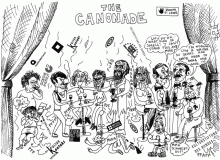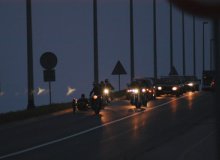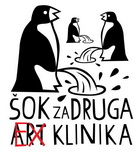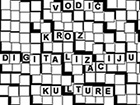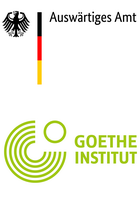Sokurov: I believe in changes in Russia
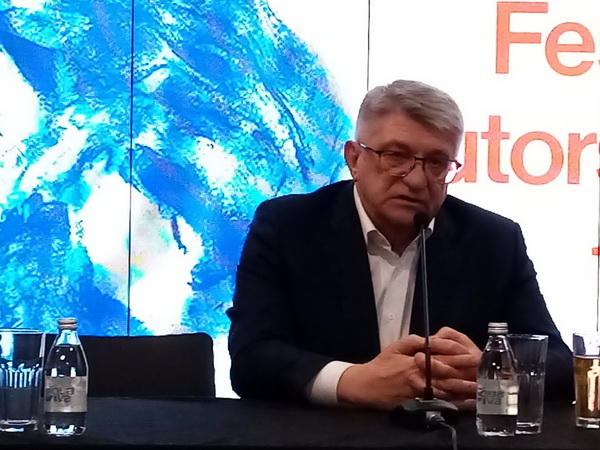
Russian director and screenwriter Aleksandar Sokurov, winner of the Lifetime Achievement Award of the 28th Author's Film Festival (FAF), presented the film "Fairytale" in Belgrade, which the audience in Russia will not see - as he said - both because of him and because of the content of the film itself, which follows the conversations between Hitler, Mussolini, Stalin and Churchill in purgatory, using archive footage.
"I think it's a complex question (why it won't be presented). Both because of me and because of my relationship with certain people in the government, and also because of the content of the film. I really hope and believe in the changes that can happen in my homeland. Today I am returning to Petrograd. My homeland is where my language is. And my language is in Russia. And probably that's where my soul is," said Sokurov at the 28th FAF, where he was awarded the "View of the World - Vojislav Vučinić" award on November 27.
Sokurov stated that the events in Russia are dramatic and that the political situation is very complex.
"I think that the events in Russia are very dramatic. Some say they are not tragic. The political situation is very complex. That worries me very, very much. Because - when political struggles are so fierce and historical circumstances are so difficult, both the youth and culture suffer. Unfortunately, many artists left Russia. It is a bitter truth. It's hard for us, it's really hard for us", said Sokurov in response to SEEcult's question about the state of the cultural scene in Russia in light of the current situation - the war with Ukraine.
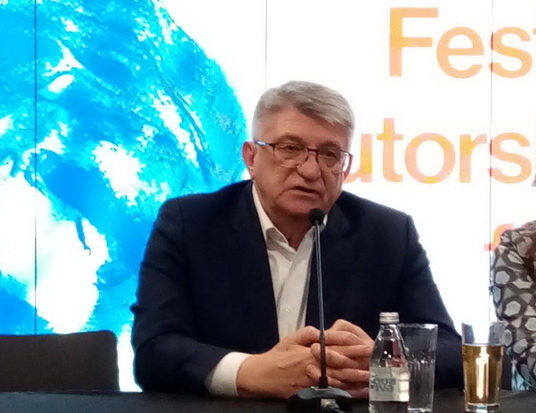
When asked what the attitude towards him personally is in the film world, since "Fairy Tale" was expected to be shown in Cannes, and had its premiere later in Locarno, Sokurov said that it is difficult for him to talk about himself, because he had never been "that what is called 'your own man' neither in Russia, nor among colleagues, nor among many colleagues in the West".
"I have very firm and harsh principles. I am very strict and critical of the presenting of force on the screen. Category A festivals screen a huge number of films that depict violence. I have a very difficult relationship with the directors of certain festivals. I always appeal to them to exclude films with violence from the program, not to allow them to go to the best theaters and at the best times. And those directors answer me: 'Then what are we going to show?' I tell them: 'Show the youth'. There are many films by young authors in the world. Look at the FAF program, how many new authors there are with very diverse films", said Sokurov, whose new film had its world premiere at the recent Locarno Film Festival.
According to him, he very often offers to shoot films in a way that is unacceptable for the film environment. As an example, he cited "The Russian Ark", which "caused great irritation among film professionals".
"The public welcomed it very well in many countries, and he irritated the professionals... When you shhot a war spectacle, you distract the viewers from the historical essence. Such commercial films are very profitable for the authorities, parliament, politicians... It is their favorite genre in the whole world. Only one former president of France liked Tarkovsky's films and helped him. Otherwise, they can't stand an author's film, or Tarkovsky, or anything like that. You will never see a politician sitting in a concert hall listening intently to Prokofiev or Messiaen. Gone are the days when a ruler funded Mozart and loved his music. The time of enlightened rulers has passed. It is a complex and important issue for the survival of the civilization of our beloved old continent. We need to know what we are fighting for in the field of culture", said Sokurov.
Sokurov also assessed that Europe is "infected with wars", which America only observes and pushes buttons as needed.
"Don't worry about America! It will always survive and find its place. As for the film, the "Fairytale" is a story about the diseases of the old continent, it is our European problem. I consider myself a European. Russia is part of Europe. We are sick of militarism, we are infected with wars. The First World War started in Europe, the Second as well. Every time some difficult circumstances arise. That’s enough! We have to understand what is happening here with our heroes and our history, to understand where the fault lies with our leaders and where is the fault of the people who support them. And the Americans will always watch us and, when required, press certain buttons or levers. That Atlantic Ocean is a divine thing. Far far away. But always there somewhere. Thank God there is an Atlantic Ocean," said Sokurov, whose "Fairytale" follows the conversations of Adolf Hitler, Benito Mussolini, Joseph Stalin and Winston Churchill in purgatory, using archival footage.

Fairytale, photo: FAF
Speaking about the way he presented those historical figures and whether there is a danger of mythologizing them, Sokurov said that they were people with very impressive characters, which was interesting to him and that was why he had made the film.
"My heroes are neither dark nor boring. They are cheerful, funny, sometimes smart and sometimes a bit silly. After all, people very active in their work. But they happened to live in a very difficult time, a time of delusions, a time of crime and a time of great physical actions. Sometimes they made good decisions, sometimes they were wrong. They were wrong more often. But we know that politicians make mistakes more often than they make good decisions. In science, over time, it is proven whether the experiments were correct or not, and politicians, chancellors, and presidents can already see that they were wrong today, and especially tomorrow. It's just that we as a people can see the delusions of our leaders, and the leader continues to follow that false path for a long time, not seeing that it is a false path and that he is mistaken. But we should give credit to that time, because that period brought together great personalities and great professionals around those problems", said Sokurov, noting that the "Fairytale" is not journalism and is not a documentary, but an investigative film - artistic fiction based on very accurate, impressive and documentary evidence.
"Practically everything that is in our film was actually spoken by its heroes in real life. And there are different testimonies about that", he added.
"I rarely speak well of my films, but for someone who is 71 years old - this is a very good result. A film requires enormous energy, endurance, will, life force, otherwise it cannot succeed. I am happy that I managed, with my young colleagues, to finish the film and that we can show it to Europe. Unfortunately, this film cannot be shown in Russia. I hope for the audience. I want young people to pay attention to history, to this story which is not so ancient. First of all, I care about young people, they should be helped, assisted all the tima", said Sokurov.
Sokurov is the first foreign laureate of the FAF Lifetime Achievement Award, and some of the previous winners were directors Puriša Đorđević, Želimir Žilnik, Goran Marković…
On the eve of the presentation of the FAF award, Sokurov had a joint interview with a group of journalists, who reported that - although the current political situation in his country was constantly "hanging in the air", few of them bothered to ask him anything directly on the subject, since Sokurov was clear in every presentation that there was a threat of war and that it would be better for politicians to sit down at a long table and - if necessary - talk to the death in order to avoid an armed conflict.
Director, screenwriter, cinematographer and film theorist, art historian by education, Sokurov is the author of numerous cult films, including The Russian Ark, The Lonely Voice of a Man, Days of Eclipse, Mother and Son, Father and Son, Moloch, Taurus, The Sun, Alexandra, Faust, Francofonia.
Photo: ZD/SEEcult
(SEEcult.org)
*Funded by the Stabilisation Fund for Culture and Education 2022 of the German Federal Foreign Office and the Goethe Institut

